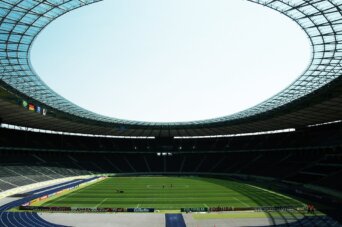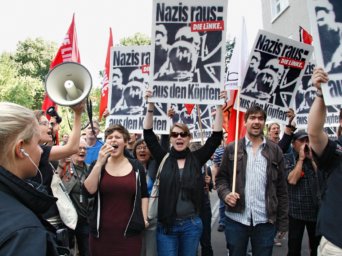- About
- Topics
- Picks
- Audio
- Story
- In-Depth
- Opinion
- News
- Donate
- Signup for our newsletterOur Editors' Best Picks.Send
Read, Debate: Engage.
| topic: | Anti-Semitism |
|---|---|
| located: | Germany |
| editor: | Abby Klinkenberg |
Unsurprisingly, anti-Semitism in German football has a long history, hearkening back to the Nazi-era use of the pejorative Judenklub (“Jewish club”) to denigrate teams with roots in or connections with the Jewish community. Reports of anti-Semitic violence continue to rise across both Germany and Europe and the football pitch is no exception to this trend. In response to anti-Semitic chants billowing through stadiums and the violent right-wing hooliganism that abets it, an EU-backed initiative called Changing the Chants is challenging football clubs across Europe to take rising anti-Jewish extremism seriously.
Earlier this year, a survey of athletes competing for Makkabi Germany, the country’s Jewish gymnastic and sports association, indicated that over two-thirds (68 percent) of Makkabi footballers had experienced anti-Semitic incidents - this despite the fact that the majority of athletes in the association do not identify as Jewish. The frequency of these incidents among Makkabi members has also been detailed by the German newspaper Spiegel, which laments “The Creeping Return of Anti-Semitism to Munich.”
However, this trend is not limited to Munich, nor to Germany itself: anti-Semitism is on the rise all over Europe, surging over the course of the past year. In fact, there is evidence that the pandemic-related lockdowns have exacerbated right-wing sentiment and anti-Semitic fervour. The German government recently committed €35 million ($41.5 million) to support the fight against anti-Semitism and anti-Semitic incidents, which increased in the country by 15 percent last year, according to official figures.
Eager to tackle this pressing issue that has particularly savage historical roots in Germany, the German football club Borussia Dortmund has been particularly proactive in its approach to dealing with anti-Semitism among its supporters. Since 2011, the club has been educating its supporters about Jewish history and the perils of anti-Semitism by initiating and hosting visits to concentration camps, where much of Dortmund’s Jewish community was taken and murdered during World War II, sparing only 100 Jewish individuals of the 4,500 people community.
Borussia Dortmund has reiterated its commitment by joining the Changing the Chants initiative, joining the Dutch club Feyenoord Rotterdam, the Fare Network and the Anne Frank House in the fight against anti-Semitic sentiment in European football culture through an educational approach.
Makkabi Germany has also taken steps to prevent anti-Semitic violence by partaking in the German Federal Ministry for Family Affairs, Senior Citizens, Women, and Youth’s “Democracy Life!” funding program to initiate the Zusammen1 project. Alongside the Central Council of Jews in Germany and the Düsseldorf Jewish Community, Zusammen1 hosts workshops and seminars for clubs striving to counteract the growing tendency towards anti-Semitism in the football community.
While these commitments among German football’s Bundesliga (the country’s first league) are making progress, its lower leagues have to reckon with a different level of extremist sympathies: "In top level football you're not very likely to feel any anti-Semitic sentiments, but in some the lower leagues... that can be a different story."
In August, Berlin’s fourth-tier Tennis Borussia Berlin football club appealed to the Northeastern Football Association (NOFV) to allow their jerseys to bear the insignia of a fund dedicated to victims of right-wing violence called CURA. The NOFV stated that such a promotion could "provoke a certain group of people," suggesting that that association is pandering to placate right-wing extremists - a conclusion that can also be reached from their other questionable decisions to tolerate or remain indifferent to neo-Nazi behaviour.
While initiatives like Changing the Chants and Zusammen1 are making progress in countering anti-Semitism in football, until the sport’s governing bodies like the NOFV adopt a zero-tolerance policy against anti-Semitic behaviour and until anti-Semitism is taken seriously as a fundamental impediment to social justice, the fight will go on to weed out the cultural roots of anti-Jewish bigotry.
Photo by Hiroshige Fukuhara

